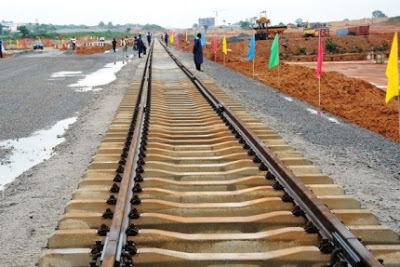Against report in section of the media that Lagos-Ibadan rail project
cost was over-bloated, the Permanent Secretary, Federal Ministry of
Transportation, Mr. Sabiu Zakari, said that the contract sum of the
Lagos-Ibadan railway project is $1.6 billion as against the $2 billion
allegedly reported and that the cost index/km is $4.09 million as against the
S$13.6 million being brandied.
cost was over-bloated, the Permanent Secretary, Federal Ministry of
Transportation, Mr. Sabiu Zakari, said that the contract sum of the
Lagos-Ibadan railway project is $1.6 billion as against the $2 billion
allegedly reported and that the cost index/km is $4.09 million as against the
S$13.6 million being brandied.
Zakari
insisted that the Lagos-Ibadan railway project was being executed in the spirit
of transparency and accountability of which the administration stands for.
insisted that the Lagos-Ibadan railway project was being executed in the spirit
of transparency and accountability of which the administration stands for.
This
clarification is coming against the backdrop of a report that Ghanaian-European
Railway Consortium (GERC) had agreed to construct a 340-kilometre standard
gauge railway line in Ghana for $2.2 billion and that the Ghanaian authorities
had turned down China Civil Engineering Construction Company (CCECC) owing to
high cost of the project and decided to employ the services of a European firm
with a lower contract sum.
clarification is coming against the backdrop of a report that Ghanaian-European
Railway Consortium (GERC) had agreed to construct a 340-kilometre standard
gauge railway line in Ghana for $2.2 billion and that the Ghanaian authorities
had turned down China Civil Engineering Construction Company (CCECC) owing to
high cost of the project and decided to employ the services of a European firm
with a lower contract sum.
The
Permanent Secretary stressed that there is no basis for comparison as raised by
the allegations, saying that the Ghanaian government had since refuted the
publication, describing it as “containing a lot of factual inaccuracies.”
Permanent Secretary stressed that there is no basis for comparison as raised by
the allegations, saying that the Ghanaian government had since refuted the
publication, describing it as “containing a lot of factual inaccuracies.”
He
further explained that the Lagos-Ibadan railway track is actually 386
kilometres since it is a double track rail-line as against the 156 km alleged
which is just the distance from Ebute Metta (Lagos) and Ibadan terminal
stations only.
further explained that the Lagos-Ibadan railway track is actually 386
kilometres since it is a double track rail-line as against the 156 km alleged
which is just the distance from Ebute Metta (Lagos) and Ibadan terminal
stations only.
According
to him, the railway project does not depend solely on the distance between
terminal points but rely on various factors, which include but not limited to
terrain, core operation accessories, land acquisition and compensation,
earthworks, bridges, culverts and stations.
to him, the railway project does not depend solely on the distance between
terminal points but rely on various factors, which include but not limited to
terrain, core operation accessories, land acquisition and compensation,
earthworks, bridges, culverts and stations.
Besides,
he said that due diligence was followed in the award of the contract as the
project was approved by Federal Executive Council (FEC) after a certificate of
no objection by the Bureau of Public Procurement was issued.
he said that due diligence was followed in the award of the contract as the
project was approved by Federal Executive Council (FEC) after a certificate of
no objection by the Bureau of Public Procurement was issued.
The
first segment of the project was approved in 2012 while the current
administration approved the second segment to link Ebute Metta (Lagos) to Apapa
Port complex to ease the perennial traffic gridlock that has defied solutions.
first segment of the project was approved in 2012 while the current
administration approved the second segment to link Ebute Metta (Lagos) to Apapa
Port complex to ease the perennial traffic gridlock that has defied solutions.
The Guardian

































































